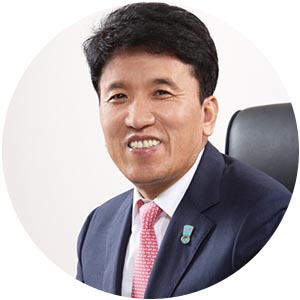When Korea Exchange Bank (KEB) merged with Hana Bank, they formed Korea’s largest bank, with $243 billion in total assets in 2015, and $143 billion in lending as of November. CEO Ham Young-joo sat down with Global Finance editors to discuss economic conditions and KEB Hana’s plans for growth.

Global Finance: What strengths does KEB Hana Bank, now Korea’s number one lender, bring to private banking post-merger?

Ham Young-joo: The merger expanded KEB Hana Bank’s global network to 134 locations in 24 nations. We plan to increase our local retail customers in foreign markets like China and Indonesia and to strengthen our relationships with overseas branches to create global synergy.
Our main focus is to increase profits and active investment, especially with small to medium-sized corporations and retailers, and find “smart banking” cost. We do not expect interest rates to rise in the near future, so our plan is to build our credit-worthiness and offerings in non-interest-bearing activities (e.g. investment product, foreign exchange).
We look forward to boosting our sales force and finding synergies in June when a new computer system will join Hana Bank’s advantages in private banking with Korea Exchange Bank’s lead in foreign exchange. Additionally, we are focusing on raising employees’ competence in asset management.
GF: Given current volatility—expected to continue through 2016 —how are you positioning the merged entity for success?
Ham: Korea’s real GDP growth in 2015 was 2.6%, lower than the 3.3% of 2014. The 5% annual growth we enjoyed prior to 2008 dropped to the 3% range after the crisis, and does not look likely to change in the near future.
As for the bank, securing profitability through reducing costs is an urgent priority. Fixed expenses need to be reduced by using mobile channels while decreasing redundant branches. We are aiming for all employees to become private bankers by training and supporting employees to become better at asset management. Moreover, for the high-net-worth individuals, KEB Hana’s portfolio management system analyzes investor portfolio profits and variables, to adjust risk.
GF: The Korean government has lately emphasized its resolve to lift Korea out of the low-growth, low-inflation environment. Is more monetary easing expected?
Ham: In mid-February, the Bank of Korea announced its intention to keep its base interest rate on hold after it was lowered to 1.5% in June 2015. The reasons are 1) the world financial market is in a depression; 2) North Korea’s long-distance missile launch heightened geopolitical risk; 3) Japan’s negative rate announcement; and 4) numerous countries participating in the low-interest flow. Aside from decreasing the base interest rate, easing the household debt of $1,200 billion is a problem.
This year, emerging countries’ equity and fixed income markets, including Korea’s, might be exceptionally sensitive to major central banks’ liquidity policies and recovery plans. The Kospi Equity Index increased right after Yellen’s dovish announcement at the end of March. The central banks will struggle between pressure to hold down inflation and pressure to spark economic recovery.
GF: How is China’s slowdown impacting Korea’s economy?
Ham: According to Goldman Sachs’ September 2015 report on the Chinese economy, its effect on the Korean economy is minimal because depreciation of the renminbi to won is small. However, Korea’s reliance on exporting to China is very high, at 25%. When Chinese domestic spending drops 1%, the Korean economy falls 0.17% to 0.18%. As a result, a sluggish Chinese economy cannot be ignored—with foreign capital pullout a great concern.
It’s different from the 1997 or 2008 crises. Now, foreign capital withdrawal from the stock market, mainly by Europeans, is pouring into the bond market. According to the Bank of Korea, foreign exchange reserves totaled $367 billion as of January 2016, which the Bank believes can cover foreign catastrophe. But that steadily declined from $369 billion in October, raising concerns from conservatives.
GF: Lower prices should in principle be a boost to oil-importing nations, yet the oil dividend is not appearing. Why not?
Ham: Considering the recent Korean economy and its circumstances, it is unclear how much [oil price drops] stimulate the four Asian tigers. Most corporates are not increasing capital expenditures or R&D investment. Thus, household consumption and the disposable income of individuals aren’t growing.
The major reason is negative expectations for the future. Uncertainty makes reasonable people keep more assets in cash deposits and equivalents. Last February, Korean banks’ aggregate deposits increased US$13.4 billion, to US$ 1,401.6 billion, and its money market funds also soared US$ 6.4 billion, due to large inflows of institutional assets.
High housing costs counterbalance cheap oil. New real estate policy has made the real estate prices in the capital of Seoul and rural cities significantly higher. In addition, rent prices are soaring as landlords seek greater yields to compensate for lowered interest rates. Middle-class citizens spend their disposable income on higher rents or paying off their housing loans. Some foreign investors worry about the amount of Korea’s lending. However, sufficient cash equivalents for paying off the interest mean a very low probability of popping defaults and serious asset write-downs.
GF: Living with an unstable North Korea is a reality. Does it impact the economy or investor sentiment?
Ham: North Korea’s recent nuclear test and long-distance missile launches since January 6 have deepened geopolitical risk; however, the economic impact is limited. The top global rating agencies—Moody’s, S&P and Fitch—have all maintained Korea’s “stable” country credit rating, as the North Korea provocation effect is temporary. Investor sentiment coincides with Moody’s. Recent events are no different from past tension, and North and South Korea conflict will not likely happen.
Even though this past March the UN adopted new sanctions blocking North Korea’s mineral exports, North Korea continues to threaten counterparties. North Korea seems to take bold action in order to keep strategic positions in denuclearization-related discussion. To cool down the peninsula’s nuclear tensions, the South Korean government and the international community need further engagement with North Korea.
GF: Particularly in the past ten years, Korea has been a vibrant leader of ‘soft power’ in Asia. What’s the source of the vibrancy?
Ham: The Asian financial crisis of 1997 revealed a weakness in Korea’s reliance on big conglomerates, so the government took action by providing tax incentives and funding in IT and in the cultural sector.
For example in the [cultural] “Korean Wave” industry, a few high-profile movie stars and K-pop singers made their product stronger with better sound quality. Furthermore, the industry applied new technologies, massive broadcasting, concert planning, sound effects, stage constructions, SNS/online marketing tools, etc. The overseas market widely embraced it. Since 2000, Korean Wave-related businesses began utilizing financial support to expand in quality and diversity. With investment banking and initial public offerings, they became entertainment company groups, creating another cultural brand.
As Korea is sandwiched between China and Japan, it has studied the game of survival for a long time. When the country is going through hardship, Koreans’ special energy is to unite.



